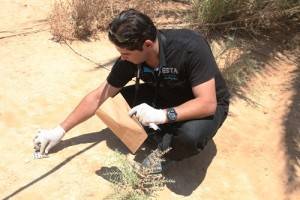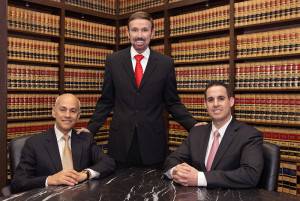Preparing or Offering False Evidence: California PC 132 and PC 134
California law does not look favorably upon any person who prepares or offers false evidence in any court proceeding. In fact, a person who is found to have done either act, whether the proceeding is a criminal trial or a civil trial, can be convicted of a felony under California Penal Code sections 132 or 134.
The Differences Between PC 132 and PC 134
A quick glance at these two laws might leave a person thinking that there’s little difference between them. Penal Code section 132 PC states:
“Every person who upon any trial, proceeding, inquiry, or investigation whatever, authorized or permitted by law, offers in evidence, as genuine or true, any book, paper, document, record, or other instrument in writing, knowing the same to have been forged or fraudulently altered or ante-dated, is guilty of felony. 1”
Similarly, Penal Code Section 134 PC States:

“Every person guilty of preparing any false or ante-dated book, paper, record, instrument in writing, or other matter or thing, with intent to produce it, or allow it to be produced for any fraudulent or deceitful purpose, as genuine or true, upon any trial, proceeding, or inquiry whatever, authorized by law, is guilty of felony. 2”
The text of both laws is roughly the same length and uses many of the same words and phrases. Both laws are meant to punish persons who intend to use falsified written records (including photographs, letters, email, etc.) to help their case in court.
However, they key difference between offering and preparing false evidence is when the act occurs. Generally, you are guilty of preparing false evidence if you have done so prior to the court proceeding; while you are guilty of offering false evidence if you have done so (or have instructed your attorney to do so) as the proceeding is occurring.
This also means that a person can be guilty of preparing false evidence even if the evidence never finds its way into a legal proceeding. Thus, the crime of preparing false evidence can be said to be broader than the crime of offering false evidence.
Related Crimes to PC 132 and PC 134
Preparing and offering false evidence are crimes that fall under the broad category of obstruction of justice. These are crimes that are meant to punish those who purposely interfere with legal matters, including police investigations and court proceedings. Some of these crimes include:
- Perjury (Penal Code section 118)
- Destruction or concealment of evidence (Penal Code section 135)
- Planting evidence (Penal Code section 141)
- Forgery (Penal Code section 470)
Key Elements in the Prosecutor’s Case for Preparing or Offering False Evidence
“Evidence”
Notice that both laws refer to the types of evidence that a person might falsely offer or prepare: documents, books, papers, records, or other instruments. Generally speaking, this means that Penal Code 132 PC and Penal Code 134 PC are laws that focus on evidence that is in writing. However, California’s courts have held that under PC 134, false material can include:
- Photographs
- Video and audio recordings
- Body tissue and fluid samples 3
“Trial, Proceeding, Inquiry, or Investigation”
Next, we need to know which types of legal proceedings are subject to these laws. The short answer is that PC 132 and PC 134 apply to any kind of hearing or investigation that is authorized by California law. This means that evidence presented in proceedings such as small claims trials, traffic trials, arbitration, mediation, or even pre-trial hearings and motion hearings are subject to these laws as well as criminal or civil trials.

“False”
Lastly, what does it mean to say that a piece of evidence is “false?” Under Penal Code 132 PC and Penal Code 134 PC, false is not synonymous with “incorrect.” Therefore, if evidence is offered that is subject to multiple interpretations and the jury disagrees with the offering party’s interpretation, then the person who offered the evidence would not be found to have offered “false” evidence.
Instead, under these laws, evidence is false if it is, with knowledge that it is not true, represented as a genuine or true fact. For example, suppose the defendant in a murder trial has an alibi that he was shopping at a hardware store when the victim was killed. As evidence, he presents to the court a receipt showing what he bought on the date and time in question from the hardware store. In reality, the receipt belongs to a friend who happened to buy something from the store on that day, and the defendant asked him to let him use the receipt. Under these facts, the defendant could be found guilty of offering false evidence. The friend could also potentially be charged with preparing false evidence if he knew the accused was going to present the falsified evidence in court.
“Knowing/Fraudulent or Deceitful Purpose”
Many criminal statutes require that the defendant knew what he or she was doing, and that their act was meant to accomplish some goal. Under PC 132 and PC 134, this means that the person who prepared or offered false evidence knew that it was false, and had the purpose to deceive the court, jury, or officer to whom it was given or would be given. However, a person cannot be convicted of violating California Penal Code 132 PC or Penal Code 134 PC unless he or she intended that the false evidence would actually be presented in a legal proceeding.
Sentencing and Punishment for Violating Penal Code 132 PC and Penal Code 134 PC
PC 132 and PC 134 are felonies that are punishable by a sentence of 16 months, two years, or three years in state prison.
Alternatively, the court has the discretion to instead impose probation along with up to 364 days in county jail, a fine, or both. 4
Possible Defenses to Charges of Preparing or Offering False Evidence
If you have been charged with preparing or offering false evidence, a skilled criminal defense attorney can raise several defenses on your behalf. These defenses may include
You reasonably believed the evidence was true.
As noted above, PC 132 and PC 134 require a culpable state of mind. This means that if you were unaware that the evidence you prepared was false, you cannot be convicted under PC 132 or PC 134. If it was reasonable for you to mistakenly believe what you were offering was true, but it turned out to be false, you should not be found guilty of either of these crimes.
When you created the evidence, you were not aware that someone intended for it to be used in a legal proceeding.
If you were asked or hired to create a document, not knowing that the person who asked you to do so wanted it so that he or she could mislead a court, you could be free from blame for having followed their instructions.
Suppose that you are a graphic artist, and you are hired by a beauty products manufacturer to touch up some photos of models by removing wrinkles and bags under their eyes. At the time, you were told that the photos would run in a magazine as advertisements, and you were unaware that the company was fighting a lawsuit for its products having caused severe eye injuries to the people who used them. If the manufacturer used your work as evidence in a lawsuit that its product truly removes wrinkles and eye bags, you could not be held accountable for having prepared false evidence because you were unaware of the company’s true intention for using those photos.
Frequently Asked Questions Regarding the Crime of Preparing or Offering False Evidence (PC 132 or PC 134)
1. Will I be convicted if I did not know the evidence was false when I presented it to a court?
Although a zealous prosecutor might try to convict you for having presented false evidence to the court, it is unlikely that he or she will be able to prove that you knowingly submitted false evidence. However, it is crucial that you hire an attorney to investigate any evidence you plan to present.
2. What if the false information was prepared before there was ever a case?
This is a common way that PC 132 and PC 134 are charged, especially in cases concerning fraud. For example, if you submitted false records of ownership of property to a bank or a government agency, and then used those false records as proof that you were the true owner of the property, you could also face charges under PC 132 or PC 134. The prosecution would need to prove that at the time you created those records, you anticipated that the records would be part of a legal proceeding of some kind. 5
3. What is the difference between preparing or offering false evidence and perjury?
Unlike PC 132 or PC 134, perjury under California Penal Code section 118 is a crime of willfully making a false statement while testifying in court, in a deposition, or in a sworn legal document. Although perjury can be in written form, typically, perjury involves lying under oath while giving a verbal statement.
Contact Wallin & Klarich If You Have Been Charged With Preparing of Offering False Evidence

Facing charges of preparing or offering false evidence can be difficult, but you do not have to fight the charges alone. You have the right to retain the help of an aggressive and experienced criminal defense attorney. At Wallin & Klarich, our attorneys have been using their legal knowledge for more than 40 years to successfully defend people just like you. We are committed to providing you with the personal attention you deserve, and to helping you overcome this difficult situation.
With offices in Los Angeles, Sherman Oaks, Torrance, Tustin, San Diego, Riverside, San Bernardino, Ventura, West Covina and Victorville, there is a Wallin & Klarich attorney experienced in California criminal defense near you, no matter where you work or live.
Call us today at (877) 4-NO-JAIL or (877) 466-5245 for a free phone consultation. We will get through this together.
1. [Cal. Pen. Code §132]↩
2. [Cal. Pen. Code §134.]↩
3. [See, People v. Bamberg, (2009) 175 Cal.App.4th 618, 621-24; and People v. Morrison, 191 Cal.App.4th 1551, 1553-54 (2011).]↩
4. [See Cal. Pen. Code §18.]↩
5. [See, People v. Bhasin, 176 Cal. App. 4th 461 – Cal: Court of Appeal, 4th Appellate Dist., 2nd Div. 2009]↩

